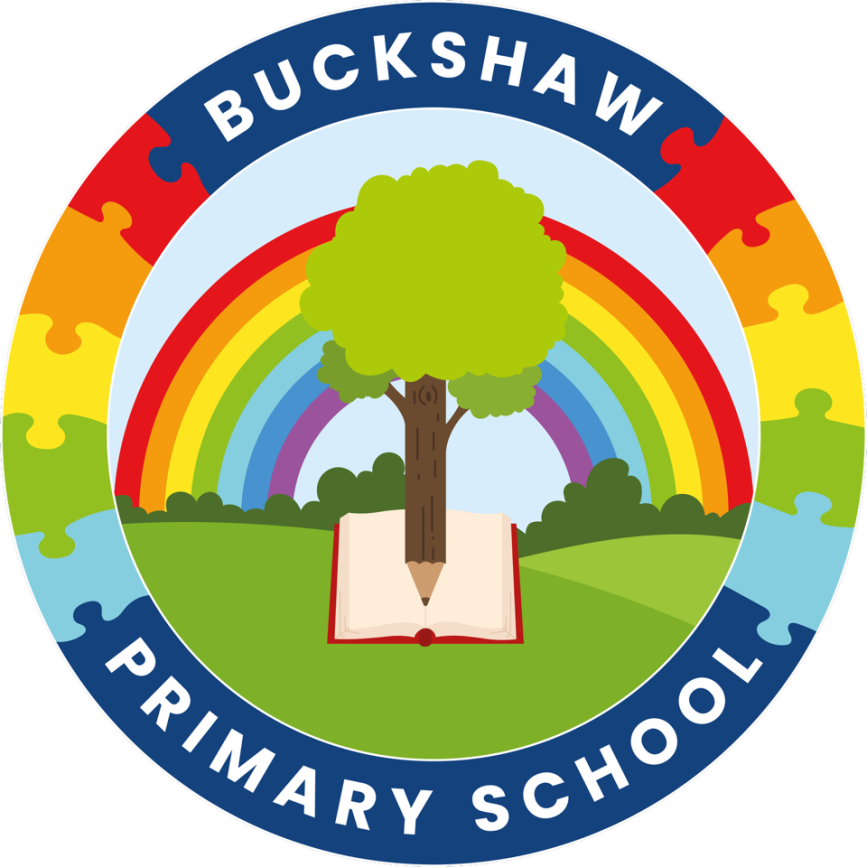Music
Intent
The National Curriculum for music aims to ensure that all pupils:
- Perform, listen to, review and evaluate music
- Be taught to sing, create and compose music
- Understand and explore how music is created, produced and communicated.
Music is a unique and expressive way of communicating that can inspire and motivate children. It is a means of personal expression and can play an important part in personal development in children. Through music, we can express, represent and communicate our ideas and perceptions.
At Buckshaw Primary School we understand how important music is as both a creative yet highly academic subject and the part it plays in a child’s life. We intend to provide children with opportunities to listen to, compose and perform music that’s linked in with learning from a range of topics.
- To develop children’s learning to become the best musician that they can be, we aim to equip them with the following skills:
- Broaden children’s musical awareness and foster an appreciation of music from different times and cultures.
- Ensuring progression of musical skills involved in performing, composing, listening and appraising.
- To encourage children to express themselves through music and develop self-esteem through musical achievement.
- Involve every pupil in music making and enable them to realise their individual creative potential.
- Contribute to the life of the school and the wider community and to enrich and contribute to other areas of the curriculum.
- A desire to challenge themselves by undertaking the study of new instruments and the further study of their own instrument.
- Encourage children to leave school with a love of music and happy memories of their musical experience that they will want to continue to develop and enjoy.
Implementation
The music curriculum ensures students sing, listen, play, perform and evaluate. This is embedded in the classroom activities as well as various concerts and performances both in and out of school. By using Charanga as the basis of a scheme of work, we can ensure that they are fulfilling the aims for musical learning stated in the National Curriculum. Pupils have the opportunity to perform, listen to, review and evaluate music across a range of historical periods, genres, styles and traditions. They learn to sing and to use their voices, to create and compose music on their own and with others. Charanga provides a classroom-based, participatory, and inclusive approach to music learning. Open-ended tasks are provided that can have a variety of responses and teachers also differentiate activities using the Charanga Bronze, Silver and Gold challenges. An emphasis is placed on musical vocabulary, allowing children to talk about pieces of music using the correct terminology. Teachers can also use the ‘freestyle’ element of the package to provide cross-curricular lessons that also follow children’s interests.
In KS1, the children enjoy singing songs and speaking chants and rhymes. They have the opportunity to play both tuned and percussion instruments which they use to create, select and combine sounds. They also listen and move to a wide range of music.
Children in KS2 build on the skills acquired in KS1 so that, by the end of year 6, they sing and play with increasing control and self-confidence. They deepen their understanding of music in the world and the significance of music through history. Children are encouraged to explore their own musical preferences and discuss these with confidence.
Performance is at the heart of musical teaching and learning. Weekly singing practice introduces the children to different genres of music and composers. Every child at Buckshaw Primary School is given the opportunity to perform to each other in class. Pupils in Key Stage Two, in addition to their class music, will have the opportunity to learn the violin or flute through the Lancashire Music Service. In Year 5 and 6 the music teaching is based around learning the ukulele. Our Christmas and end of year performances provide an opportunity for the children to share their work in music with parents, governors and other friends of the school. In addition, children at Buckshaw Primary School are able to use technology to create digital music. Children from the youngest year groups use apps including Purple Mash to explore musical sounds, whilst this progresses through different programmes until UKS2, where children can compose whole songs.
Impact
Our music Curriculum is planned to demonstrate progression and build on and embed current skills. We focus on progression of knowledge and skills in the different musical components and like in other subjects, discreet teaching of vocabulary also forms part of the units of work.
If children are achieving the knowledge and skills in lessons, then they will achieve age-related expectations at the end of each academic year. Children will understand and apply subject-specific vocabulary. They will use music as a form of expression and participate in wider musical activities. Children will develop a love of music and an appreciation of different music forms.
Music reflects the culture and society we live in and so the teaching and learning of music enables children to better understand the world they live in. Children are able to enjoy music in as many ways as they choose-either as listener, creator or performer. Children have the opportunity to discuss and share their own thoughts, opinions and ideas, acknowledging and respecting that these may vary from others.
Opportunities are provided for children to further support their understanding by visiting musicians, concerts and school productions. External interests and talents are also encouraged and showcased in class and assembly, ensuring that everyone is challenged regardless of previous musical experience.
